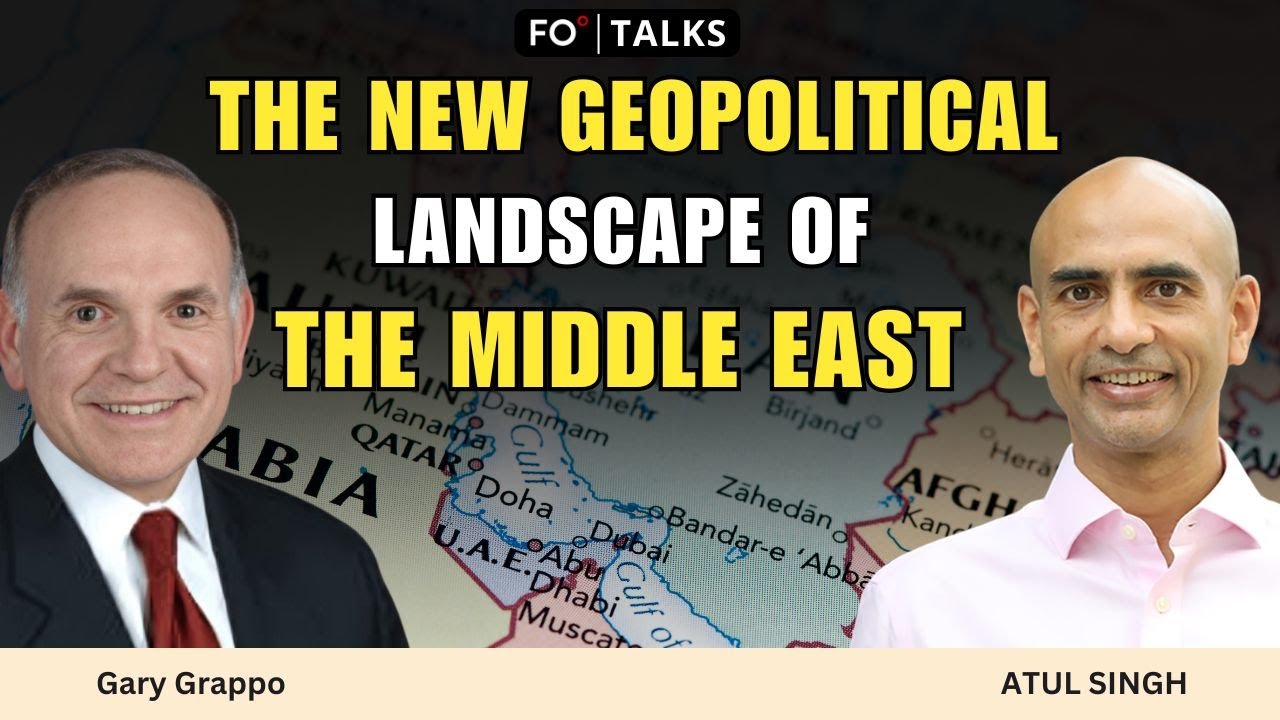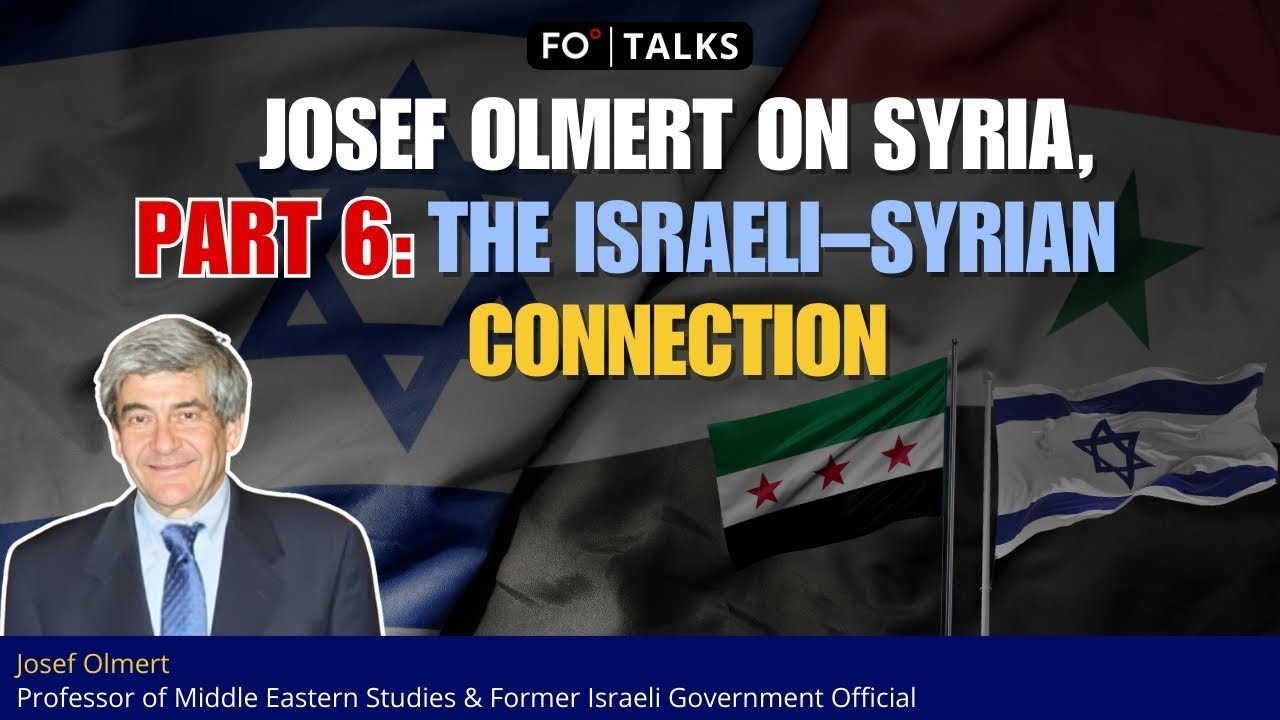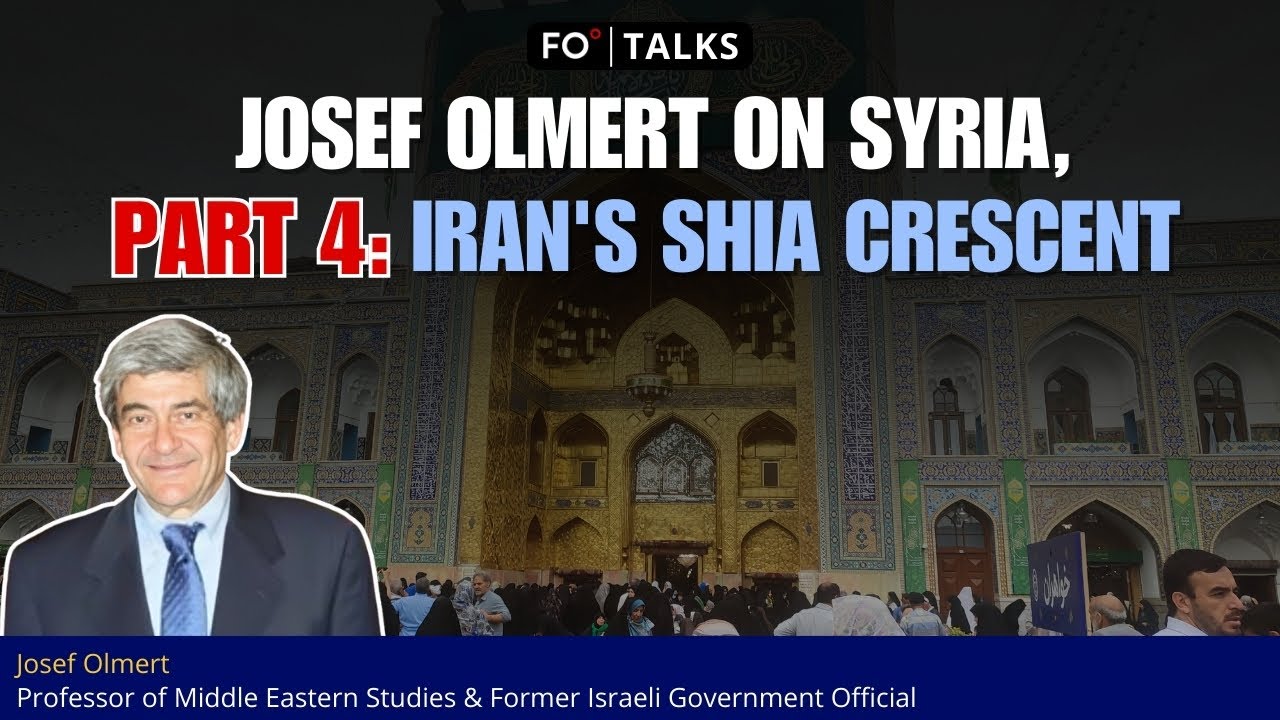Atul Singh: Alright, we move on now to New Troubles in Gaza, Israel, Syria and Turkey. And since Glenn has been the head of the Office of Transnational Threats, since Glenn was active in the War on Terror and Glenn has a lot of friends in Israel, and I’m sure in the Mossad, let’s hand the floor over to Glenn to talk about, at least, Gaza and Israel, to begin with.
Glenn Carle: Well, the structure of Atul’s and my discussion today, and thus of the world that we’re trying to address, is to begin with farce and then to discuss hope, and now to move to tragedy.
Atul Singh: It’s a great structure.
Glenn Carle: Yes. Well, such is life, I think, for us all. The Middle East has, all of our lives, been in chaos. It’s long been known by anyone who focuses on the Middle East that it’s a part of what the CIA has called for many, many years, and scholars have, the Arc of Instability, where you have increasing existential climate and environmental factors, apart from human action: falling rainfall, increasing desertification, declining fertility of soil, an uncontrollable demographic bulge — in particular, of young males. It’s young males that create all the trouble in the world. And that’s not a facetious comment, actually. It’s flippant, but it’s also accurate. On top of which are, to use the Marxist framework, the superstructure of political institutions that have been ill-adapted prior to decolonization and since, to address any of these problems, and then being victim of the great power conflict and the pawns thereof. So there’s always been a problem, but the current issues, I think, have become even more acute, clearly because of the last two years, I guess it is already, of the Gaza war. We’ll call it the Gaza war. And before that—
Gaza conflict and the limits of military strategy
Atul Singh: October 7 is when it begins. So it’s not yet two years. October 7, the attack.
Glenn Carle: Not yet two years, yeah, it’s a year and a half.
Atul Singh: Yeah, so Hamas attacks and then Israel responds.
Glenn Carle: Yeah. But I think the criticism hasn’t extended sufficiently to embrace the destabilizing effects on the entire Middle East of the American invasion of Iraq, which led to the collapse of Syria, much as one might have opposed and disliked the Assad government. And thus to 50% of the Syrian population of 30 million people becoming refugees, more than half of whom now reside largely in Germany, leading to the problems that we just touched upon, at least indirectly, before.
Atul Singh: Glenn, sorry, they reside elsewhere. They reside in Lebanon, they reside in Turkey and, of course, some of them have gone all the way to Germany. So not all of them are in Germany. Half of them are out of the country.
Glenn Carle: No, but about five million of them are in Germany and Europe. Yeah, five of the 12, I think. So, let’s talk about specifically Gaza, and then Syria and then Turkey. And if you talk about Gaza, that means talking about Israel. And I’ll have to be quick. Netanyahu’s policy has been to destroy Hamas. The problem he is confronted, although many deny and disagree with, is the same problem that the United States faced in the way it framed, defined and understood the “War on Terror” — which is, of course, an incoherent concept to begin with. I mean, how do you fight a war against terror? Well, we fought a war against a specific organization or organizations, thinking that there could be, in military terms in the United States, a kinetic — which means a lethal — solution, by killing enough people and breaking up an institution or an organization. It’s true we did largely destroy al-Qaeda and kill a lot of people. But you don’t kill a sociological problem or a political dispute almost ever by using a conventional military. Military strategists and trainers, for all of my adult life — all of our adult lives — have been concerned about the problems of asymmetric warfare. Why did the United States lose in Vietnam? Why did Britain lose in what became the United States? And why do I think Israel has created an unsolvable problem for itself in Gaza? You can’t really eliminate the frustrations of the Palestinians and thus their enduring hostility and actions against Israel, by killing Hamas. And you can’t completely kill Hamas as it is. Gaza has been almost literally destroyed. Dozens of thousands of people have been killed, and Hamas remains extant. The consequences there are that, I think, really, Israel clearly has won a short-term victory and almost certainly will win a medium-term victory. Strategically, existentially, Israel was not threatened prior to October 7 or on October 7, and hasn’t been and will not be threatened now. Also not receiving, I think, adequate attention is what’s happening in the West Bank. Gaza has been destroyed, Hamas has been seriously weakened, Israel’s strategic security is, in some ways, unchanged because they were not existentially threatened prior to the beginning of the Gaza war.
West Bank, demographics and internal Israeli politics
Glenn Carle: But on the West Bank, the same thing is happening, and there are three ways forward: You can expel all of the Palestinians, which is an increasingly plausible solution that the far right of Israel is advocating, both from Gaza and, progressively de facto, from the West Bank.
Atul Singh: You can send the Palestinians from Gaza to Egypt, and you send the Palestinians from West Bank to Jordan, and voilà! We don’t have a problem. That is the thinking of the Israeli far right.
Glenn Carle: Exactly. And medium-term, which is years in duration — what’s medium-term, five years? Ten? Israel will be fine. But that doesn’t address the enduring enmity and hatred that existed before, and that probably guarantees — what it does likely do is destabilize Egypt and Lebanon and Jordan in ways that, long-term, will make the region even more unstable than it is now. And just as Lebanon has been destroyed and Iraq was largely fractured, and Syria has been destroyed, so you might see an exacerbation of all of those tendencies long-term. From the success of the right wing of Israel and the Israeli army to destroy, in many ways, the operational capabilities of Hamas in Gaza and eliminate the Palestinian populations. Also linked to that and Israel is that demographically, you will, in the medium- to long-term future — not ten years, fifteen — have a majority of the Israeli population that is actually Muslim. So Israel has a choice then: Is it a democracy, or is it a Jewish oligarchy? And that’s—
Atul Singh: Very quickly, that’s because 20% of Israel is Palestinian, and they are Israeli citizens. They are not in the West Bank, they are not in Gaza. They are in Israel. And when Glenn is talking about, in the long run, you could have them as a majority, it’s because their birth rates are higher than Jewish birth rates. Although the ultra-Orthodox might just compete with them and make sure that Israel remains Jewish. But the secular Israelis who form the tip of the spear of the Israeli state, they are the ones who serve in Mossad, in Sayeret Matkal, in Shin Bet, in their elite units, whether it’s Yahalom or whatever. They are the ones who are secular, do not generally have many children. Therefore, they are electorally, progressively weaker and weaker. And they are the ones under threat in some ways, because, as we have just observed. within Israel, something big happened. First, the Israeli cabinet decided to fire Ronen Bar, the head of Shin Bet. That is Israel’s internal intelligence agency. And everyone hears about Mossad, but they should know about Shin Bet. Shin Bet is an extraordinary organization. Shin Bet has some extraordinary officers.
Glenn Carle: The domestic intelligence service. Israel’s FBI.
Atul Singh: Exactly. Eh, a little different. FBI does investigation, Shin Bet does intelligence.
Glenn Carle: Don’t go into the weeds, we’re going to run out of time.
Atul Singh: Yeah. We’ll extend the time this time a little bit because of the ground we have to cover. But Ronen Bar joined the Israeli Defense Forces in 1984. He was an officer in Sayeret Matkal. He was head of Shin Bet’s Operations Division. He became the head of Shin Bet. And he’s a highly educated chap, he’s got aquiline looks, he’s ridiculously fit and good-looking. I’m told by friends who know him that he is a top man. And for the Israeli cabinet to just kick him out — well, kicking out the Shin Bet chief is obviously a political prerogative, but there is due process. And there’s not just the law, but there is convention, there is a certain tenor. And it was done under a cloud. Why? Because there is, as most people who follow Israel closely — and as I was informed this morning by some Israeli friends — the Qatari connection affair, which is a corruption scandal engulfing Israeli Prime Minister Benjamin Netanyahu. Good old Bibi, that’s his nickname. Now, what has happened is that the nearest political advisors of Bibi were involved in paid jobs promoting the interests of the Government of Qatar. Now, why is this a bit iffy? It’s because Qatar was spending $15 million — or a pretty significant figure — to Hamas, and that’s where the leaders of Hamas stay. And in March 2025, Shin Bet Chief Ronen Bar affirmed that the agency was investigating the affair. Now, this is a complex and multifaceted affair, as he acknowledged. And Ronen Bar was then kicked out whilst he’s investigating corruption which involves the Prime Minister. Now the Israeli Supreme Court has stepped in. The Israeli Supreme Court had said, “Hang on a minute, hang on a minute! You can’t just do this!” So they’ve issued an injunction to prevent Bar from being fired by Bibi. So what is happening in Israel is not just the conflict with Gaza, not just the tensions in the West Bank, not just the great successes in Lebanon. What is happening in Israel is a fundamental pull and push on the institutions of the state. It is indubitably true that a lot of Israelis find these institutions elitist, because the people who head Shin Bet, the people who head Mossad, the people who go into Sayeret Matkal tend to be officers who perform very well. Often, they may be from better-educated families. They’re almost invariably secular so far and the religious Jews who have the vote say, “Hang on a minute.” It’s a bit like people turning against elites everywhere and saying, “You can’t tell us what to do.” The difference between Israel and other societies is that this is a society which is, in some ways, a Spartan state. It has hostile neighbors. In many ways, as an MI6 friend said, it’s a modern-day Crusader state amongst a sea of hostile shores. And so if you’re playing footsie with the tip of your spear, with the sword in your scabbard, you’re playing with fire. And that is the fundamental tension within the Israeli society. And of course, there are demonstrations. Of course, people don’t like this. And people say that Bibi Netanyahu needs war to avoid scrutiny, and Bibi Netanyahu does not want any scrutiny. And by kicking out Ronen Bar, he’s postponing the inevitable. That may be true, may not be true. He’s certainly an impressive leader, he has more than nine lives, he’s much more resourceful than a cat. He’s cobbled together one coalition after another. And in democracy, things can get messy. But this is getting really, really, really messy. Of course, remember— Yes, sir.
Polarization and risks of civil unrest in Israel
Glenn Carle: I think the fundamental dynamic that you’re describing, and consequence of the Gaza crisis and the war is: Wars always polarize. And Israeli society is struggling with the ascendancy of its religious far right. So many times I’ve heard — probably many of us have, but certainly I did in Israel — that colleagues of mine or people of whom I had heard were denigrated and characterized by other Israelis as, “Oh, well, he’s not actually Jewish.” Why? Because he was a secular, reformed Jew, as opposed to an ultra-Orthodox. So we’re seeing this polarization.
Atul Singh: Yeah, and you’re right. On the one hand, thousands are rallying for a hostage deal, while there are others who say there can be no deal and we have to go hammer and tongs and destroy Hamas. So you’re absolutely right. The polarization is intense.
Glenn Carle: And I think the consequences are that Netanyahu — aligned with the far right in Israel — has defined the policy and will come to shape the nature of the policies in Gaza and the West Bank for the foreseeable future, and continue the polarization of Israel. And the consequences are much larger than in Israel, though. We’ll see these statements have contributed to—
Atul Singh: Sorry, carry on. There’s just an anecdote I want to put in when you finish. (laughs)
Glenn Carle: —Have contributed to the cataclysmic collapse of Syria. I won’t go into all the details, and I don’t think I’m capable of going into all the details — there are so many factions involved — but the larger point is that the changes... Ahmed al-Sharaa is the new leader of Syria, someone who’d been relatively briefly a member of what was called al-Qaeda — it wasn’t actually al-Qaeda — but a jihadist group in Syria, now rehabilitated because he, I think, really was a religious nationalist opponent of the secular regime of Assad. In any event, we now see growing stresses in an already destroyed society, which is Syria. And that will have consequences well beyond Syria itself, as it already has, as we touched upon in Germany.
Atul Singh: Very quickly, to add to this polarization: The polarization in Israel is so intense — going back to Israel — that there are newspaper reports of Ben-Gvir, an Israeli far-right minister, and the Shin Bet chief Ronen Bar almost having a physical confrontation, a physical fight. And two or three of Israel’s Special Operations officers told me their biggest fear in Israel is civil war. And they just have to look across the border, just across the Golan Heights, to see the civil war going on in Syria. Now, Glenn talked about broad context, and I’ll just give you one tiny detail. Well, many of the Alawites were loyal to the Assad dynasty, and by the end, it was really a sectarian dynastic regime. It began as a Ba’athist socialist regime which tried to create some idea of a secular Syria. But by the end, it was a sectarian regime — Alawites supporting the Assad dynasties, backed by Iran, a Shia power in the region, and of course, supported by Russia. And some of the Alawite officers loyal to Assad rebelled. The rebellion was forces that are now in charge in Damascus put the rebellion down and then conducted vendetta, killing many Alawites. And remember, the Alawite–Sunni schism goes back to Selim I, when he was hunting them down in 1520 or something like that. And the Shia–Sunni divide is centuries old. So that can always flare up in the region. As Glenn said, that has potential far beyond Syria’s borders.
Syrian Collapse and Turkey’s authoritarian turn
Glenn Carle: I think that’s the relevant concern for us today, or now. Of the roughly 25 million Syrians, 12 million are refugees or more — 5.4 million of whom are in Turkey and Germany and elsewhere. To give it one little sense of the catastrophe that is overflowing and affecting Europe and everywhere else. 72% of Syrians — the entire country — can only literally survive because of foreign aid, food aid and others. Half of all of the hospitals in the entire country no longer function. So the consequence has been not just refugees, but in part, the rise of the AfD, the neo-Nazi far right in Germany and elsewhere. This has both destabilized and empowered Turkey, which is the last thing I’ll talk about. Now, we’ve all heard, I think, about the big headline of the moment, which is that the Erdoğan government has arrested the mayor of Istanbul, who was the likely opponent of Erdoğan in the upcoming presidential election. This is just the continuation of the increasing totalitarian bent of the Erdoğan government and the erosion and destruction — one hopes, not ultimately — of the secular Turkish democracy.
Atul Singh: By the way, the mayor’s name is Ekrem İmamoğlu, and he has been a decent mayor. As, indeed — remember — Recep Tayyip Erdoğan was. He began as mayor of Istanbul, and he did a decent job, which is why he became prime ministerial candidate. And then, of course, he changed the constitution and then he became president. And then, of course, in his presidential terms, many terms, he’s built Aksaray the famous 1,000-room White House exactly on the spot where Mustafa Kemal Atatürk’s hunting lodge once stood. So, jokingly, many of my Turkish friends call him Sultan Recep Tayyip Erdoğan because he’s literally looking back—
Glenn Carle: He clearly aspires to that level of centralized control.
Atul Singh: Indeed. One quick thing, Glenn — I’ll add and then cede the floor to you. He looks back to the Ottoman Empire for inspiration. He wants to rekindle the Ottoman heritage. He wants Turkey to be a leader of the Muslim world, especially the Sunni world. He speaks out about Palestine and Kashmir. He definitely wants to intervene in neighboring countries, and in Syria, he has. So he’s very much neo-Ottoman. Over to you, Glenn.
Glenn Carle: Yeah. Well, all of us, every country and society, looks to its moment of greatest glory. So the Greeks still think that Pericles is ruling Athens, and the British think that Queen Victoria commands the sun. And the Americans think that we have just stormed Omaha Beach in France. And the Turks think that Suleiman the Great is building more mosques. The consequence of the arrest — and I would argue, in part because of the stresses on everywhere, Turkey in this instance, of what’s happening in the Middle East — are the largest demonstrations in over a decade. And I am pessimistic, because whoever controls the guns tends to win the arguments in a demonstration. And the changes of government in Turkey, which haven’t been peaceful, have come largely from the military, and the military seems to be well under the control of Erdoğan at present. What are the consequences larger than this, I would say? As I mentioned, the further cementing of Erdoğan’s near-dictatorship. The Middle East is being largely ignored by this administration. The Trump administration said — this is a paraphrase, but this is literally what came out of the White House: “Well, human rights are nice, but we have really nothing to say about the domestic affairs of Turkey,” which means that — also, the US administration will not just turn a blind eye to but will abet whatever the Israeli government does with regard to the Palestinians in the Middle East. And then this has implications also for what the US will do or won’t, and Israel will do or won’t towards Iran, which will affect the entire Middle East, which makes it more likely that with all this instability, Iran will seek a nuclear weapon. And it also is more likely that Iran’s government could collapse from internal opposition or external stress, which could well be military, by Iran or the US.
Atul Singh: Or a combination of the two.
Glenn Carle: And the destruction of the current Iranian regime could be a good thing. But any radical change is going to be terribly painful for many, many millions of people, however it plays out. And so the Middle East is in probably the greatest turmoil, even if it’s not immediately apparent, of any time in recent decades.
Atul Singh: Alright, on that note, we’ve come well past our allotted hour. It was lovely to have you all here for the March edition of FO° Exclusive. We will see you next month. Until then, be safe. Greetings, wherever in the world you happen to be.
Glenn Carle: Salaam.
[Lee Thompson-Kolar edited this piece.]
The views expressed in this article/video are the author’s own and do not necessarily reflect Fair Observer’s editorial policy.







































Comment